SEO Project Management: A Start to Finish Guide
SEO project management is the process of planning, executing, and evaluating an SEO campaign. Read more about what it takes to manage a full-scale SEO project.
SEO project management is the process of planning, executing, and evaluating an SEO campaign. SEO professionals, digital marketers, and content creators all participate in implementing SEO tactics. Understanding the different stages of SEO projects, and how to manage them effectively, is vital to the ultimate success of any SEO campaign.
With an effective SEO strategy, your site will be one of the top results when a consumer searches for services or products related to your business. This increased exposure can garner more attention to your business, which equates to more prospective clients. To achieve this boosted site visibility, read more about what an SEO team must do to launch and execute an effective SEO project.
Why is SEO project management important?

Any effective SEO campaign employs multiple strategies and resources to get the job done. This can range from backlink building, to content writing, to even social media content strategy. As a result, the processes involved with an SEO project involve many moving parts.
SEO project management ensures that all of those various campaign parts work together to achieve the big picture goal: Improving search engine visibility by ranking for relevant, high value keywords in your industry.
What Makes a Successful SEO Project Manager?
An SEO project manager oversees and guides workflows regarding your company’s digital marketing processes. Various resources go into an SEO project, including time, money, and team members. An SEO project manager focuses on the big picture and manages the smaller processes within a project.

Whether you function as a project manager, or hire an outside SEO agency, an SEO project manager can allocate resources, improve the quality of deliverables, and facilitate effective time-management procedures. Using project management tools like dashboards and task lists, an efficient SEO project manager functions as the supervisor of your SEO campaign.
The core of an SEO project manager’s duties is to complete SEO deliverables. These deliverables range from back-end technical SEO tasks to marketing automation. Your SEO agency will need to devise an SEO strategy based on your business’s strengths and weaknesses. Therefore, the job description of an SEO manager will vary depending on your project tasks and the outcome of your initial SEO audit.
4 Key Skills of a SEO Project Manager
Regardless of the specific projects that will be involved with your SEO campaign, there are a few qualities that every successful project manager shares:
- Communication skills: A successful project manager possesses the ability to facilitate internal communication and build client connections.
- Knowledge of the field: To successfully assess and evaluate an SEO strategy, a project manager should be knowledgeable of content management systems, HTML, CSS, and analytics.
- Leadership: To effectively manage a team, a project manager must prepare and monitor project schedules and deadlines.
- Familiarity with popular tools in the industry: Managing a workflow requires knowledge of the right tools. An SEO team may utilize Slack, Google Docs, Gmail, Google Sheets, Google Drive, and Asana for internal communication. For back-end technical SEO, task managers should be able to navigate Cloudflare, Screaming Frog, and Google Search Console.
Employing the services of a project manager can ensure fluidity of workflow and promote teamwork across your company. Improving upon internal processes and communication amongst SEO teams will yield better results overall for your SEO campaign.
The best part of enhanced communication from a SEO project manager is that it can also boost employee morale within an organization.
Major Stages of SEO Projects
SEO professionals know that an effective digital marketing strategy is much more than just adding a few keywords into their content.
That’s because Google’s search engine algorithms are complex, and meeting their quality, authority, and page experience standards require multiple SEO practices.
Yes, the main objective is to boost brand awareness by enhancing your site’s visibility on the search engine results page (SERP.) However, your relevance should be rooted in quality, not algorithm manipulation.
Here are the major stages of the standard SEO project.
Keyword Research
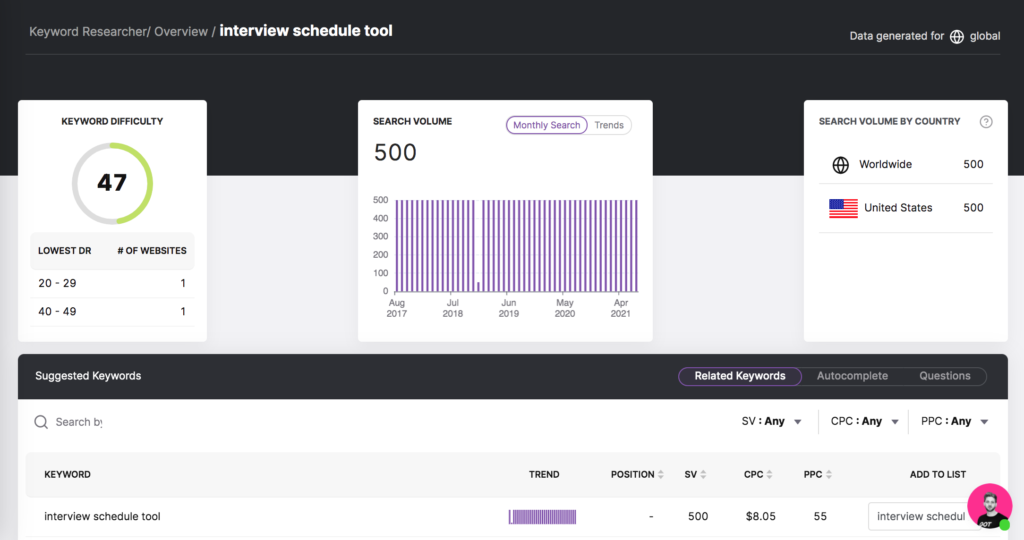
To improve your search engine rankings, your SEO team will first need to conduct keyword research. Keyword research refers to the process of researching popular words and phrases that people type into search engines. Then, it involves choosing the ones that your ideal audience or customers are actively using to find products and services like yours.
These words are called “search terms.” The content creators in your SEO marketing team will generate content that incorporates popular search terms relevant to your business. Once you choose your target keywords, the remainder of your SEO project will be aimed to get your web pages ranking for those target keywords.
On-Page SEO
After you complete keyword research, your SEO project will be turned to on-page SEO. On-Page optimization incorporates the specific keywords uncovered in your keyword research into your website’s content.
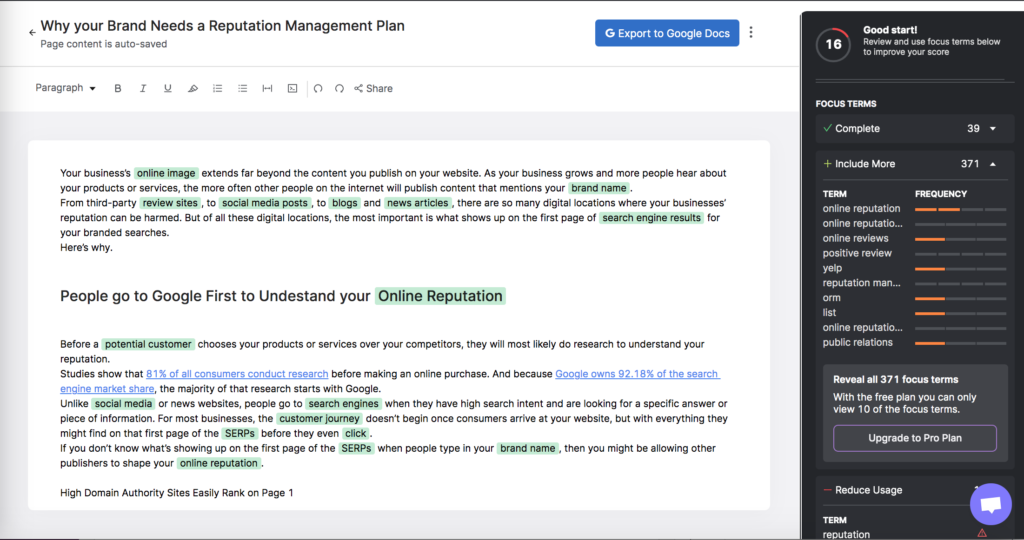
These new content additions will let search engines like Google know to associate relevant keyword searches with your business.
On the back-end, where more technical SEO processes occur, your site will be evaluated for its page experience. That’s why software developers may perform a technical audit to assess your site’s performance.
Common strengths and weaknesses include site aspects like load time, broken links, and page speed. A positive user experience that is search-engine friendly will be engaging, convenient, and informative.
Off-Page SEO
In addition to on-page SEO, SEO strategists will evaluate your search rankings, organic traffic levels, and competitor backlinks to determine the specific off-site projects your SEO campaign will encompass.
Off-site optimization is accomplished through strategies like blog posts, backlinks, and citations.
Backlinks are also commonly referred to as “inbound links.” They are links that bring users to your website from another website. Backlinks are essential to your site’s SEO performance because search engines like Google consider them when determining search engine results.
Web pages that have high numbers of backlinks usually have higher search engine rankings. Further, backlinks from more authoritative websites with higher Domain Authority will help improve your rankings even more.

Earning backlinks the right way takes a lot of time and resources, from content creation to digital public relations outreach. So for any SEO project that includes backlink building, there are various substags that require strong communication, organization, and delegation skills.
- Keyword Research: Selecting the right keyword phrases or anchor text for the backlinks
- Content Creation: Creating an original piece of content that provides value to the user and links back to the target website with contextual anchor text
- Manual Outreach: Pitching that original content to relevant publications in your industry
Local SEO
For any business that serves local or regional markets, local SEO must also be a part of your SEO project. The biggest part of local SEO–local citations–allow search engines to gather authoritative and accurate information about your business, like its name, address, and contact information.
These citations must be consistent so that prospective clients can quickly locate and communicate with your organization regardless of the means through which they came across your business. Effective citation building requires hundreds to thousands of these citations, which can be best accomplished through automation.
Local SEO may also include building location-specific landing pages or building up profiles and reviews on key third-party review sites. A well-seasoned SEO project manager will include local SEO in their SEO project when serving clients with a local market share.
Content Strategy
Intertwined within all of these stages is content creation. Content creation is used in various stages of SEO projects including on-page SEO, off-page SEO, and local SEO.
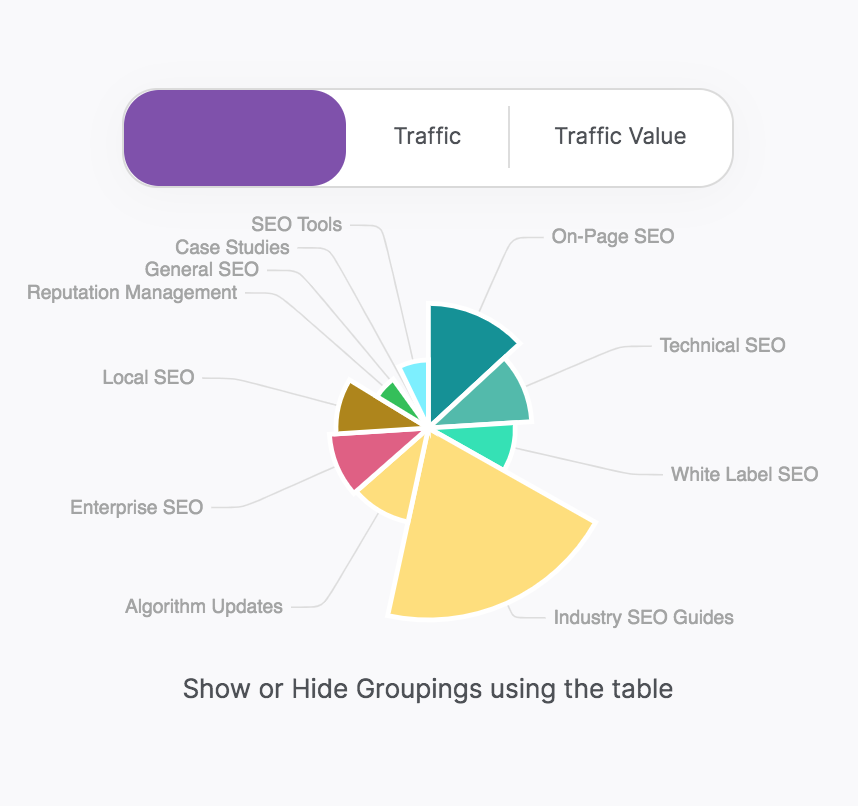
Regularly posting new content ensures that your website keeps its momentum by earning new relevant keyword rankings and providing fresh content to users.
Analytics & Reporting
Any successful SEO project manager will not only execute the above stages, they will monitor their impact and prove real results.
The analytics and reporting stage of SEO projects is key to retaining clients and earning new referrals. As a result, tools like Google Search Console, Google Analytics, and GSC Insights, are essential to SEO project managers who want to prove the value of their SEO services.
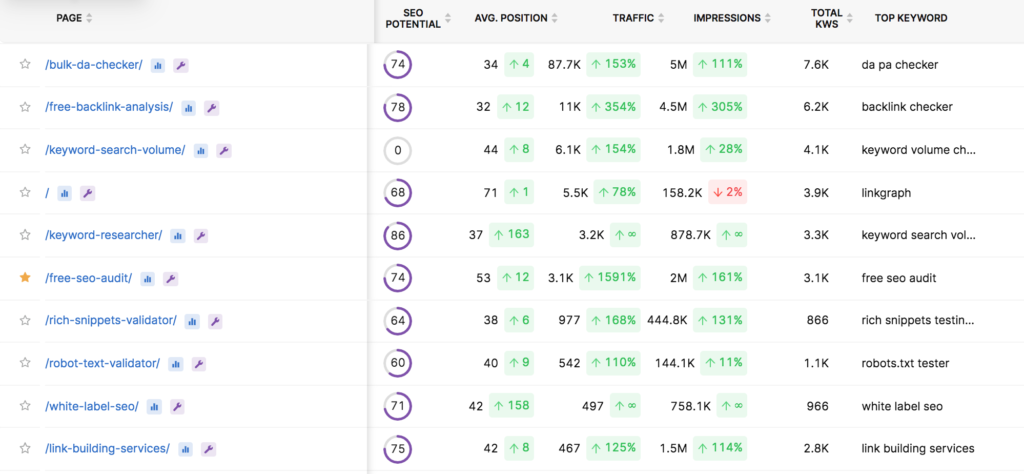
Tips for Structuring and Managing your SEO Projects
Hire an SEO Project Manager or Agency
Because SEO campaigns consist of several complex tasks, it is a good idea to turn to the help of an SEO manager to prioritize your project tasks effectively.
As mentioned above, an SEO project manager facilitates better internal communication and streamlines business processes. SEO projects not only involve the SEO team but require effective communication between web developers, stakeholders, freelancers, and internal content and marketing teams.
Structure your SEO Project with Clear Tasks and Deadlines
The next tip to a successful SEO project is structurization. Keeping up with due dates, deadlines, competitor research, and actionable insights derived from SEO tools like the Google Search Console can be quite the balancing act.

The more organized your approach, the more likely your marketing campaign is to succeed. In part, this is because SEO efforts require consistent monitoring and innovation.
Iterate, Iterate, Iterate
Google trends and updates to search engine algorithms may call for adjustments to your SEO strategy. Therefore, making it to the top of the SERPs is no small feat. Then, maintaining that visibility requires a lot of time and effort.
Looking at the analytic and reporting to inform your optimization decisions is essential. If an optimization action has an undesirable outcome, iterate accordingly.
Great SEO project managers know how to look at the data and identify where strategic choices are successful or off-base. Then, they iterate to keep improving rankings and SEO performance overall.
Choosing an SEO Project Management Software
The right SEO tools can equip your content strategy team with 24/7 monitoring of essential data like site performance and API functionality. There are a few key elements to watch out for when choosing a project management software for your SEO campaign.
One of the best functions that SEO software can have is a user-friendly interface. Effective SEO software can compile insights into easily digestible dashboards with graphs or spreadsheets. This compilation of valuable data allows team members outside of the technical SEO team to assess information quickly.
This business process automation can free employees’ time up for jobs requiring human intervention, like creating new ideas or identifying potential problems in SEO strategy. Here are some tools to consider incorporating into your SEO project management efforts.
Asana
Asana is a task manager’s favorite tool. Why? Because Asana’s key feature is that it acts as support staff to the SEO project manager. It can provide reminders for due dates and deadlines and help manage a team’s workload by providing a platform for easy task delegations.

Internal communication is essential. So implementing a collaboration application like Asana will allow company leadership to make announcements and create team discussions.
Slack
Slack is another one of the best communication tools available.
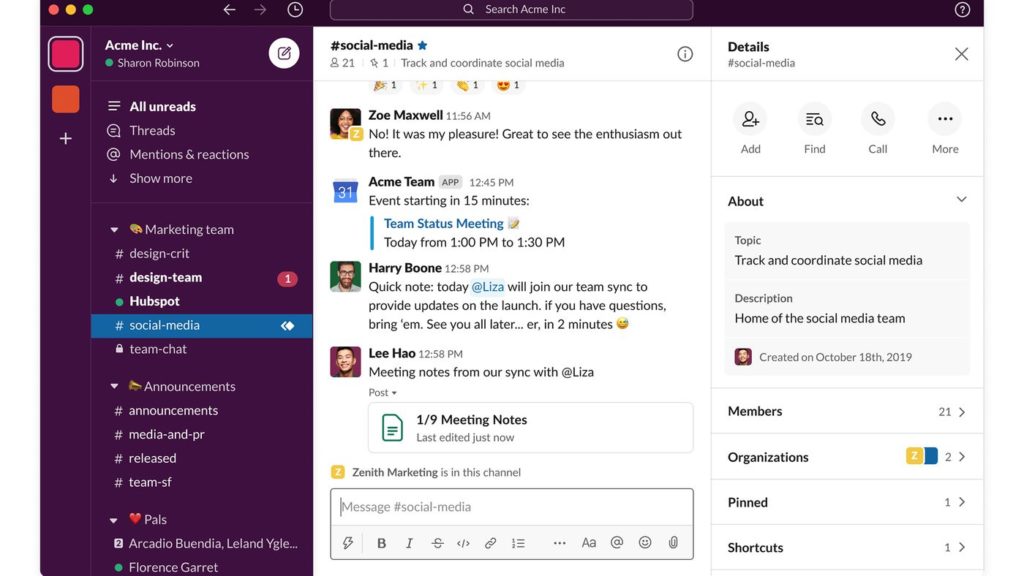
Members of an SEO team can create separate channels within their organization and share input on specific tasks. So if your organization works with external clients, you may need to add a project management tool with permissions to your SEO toolkit.
GSC Insights
For campaign tracking and performing, no other SEO software tool is as useful and practical as GSC Insights. The tool is built over Google Search Console. That means comprehensive, accurate SEO data to measure the success of your SEO project.
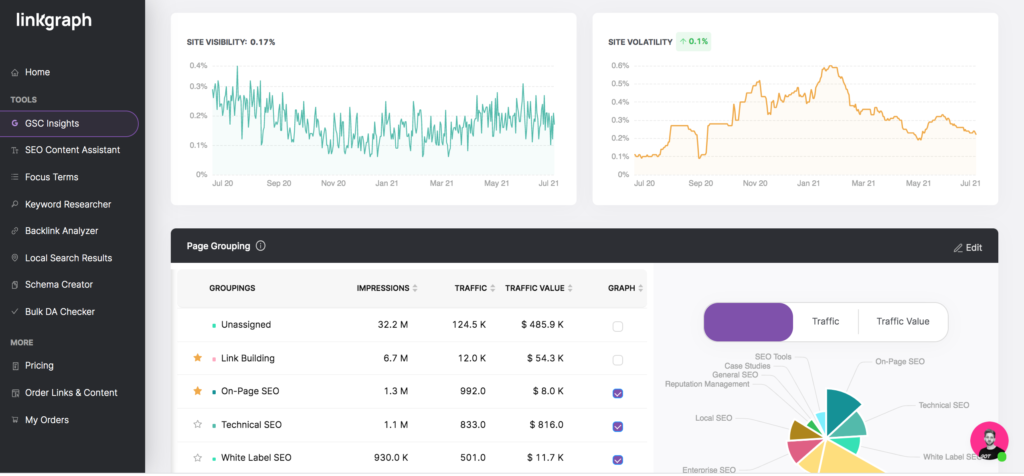
For campaign tracking, use the Site Events feature of GSC Insights. It allows you to track your campaigns progress alongside the historical data like keywords, impressions, and organic traffic. As a result, a SEO project manager can see their SEO success clearly and convincingly.
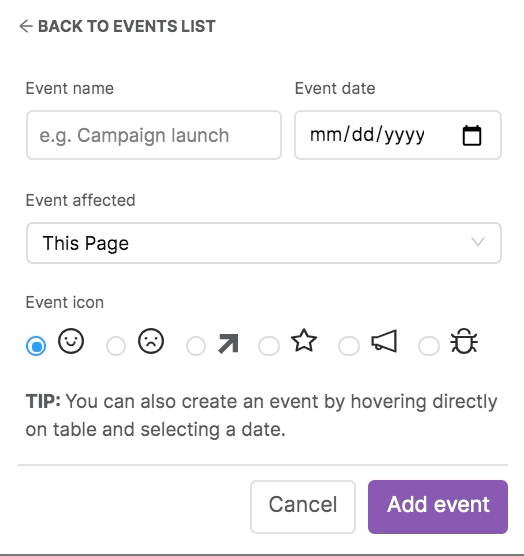
Common Setbacks in SEO Projects
With any large-scale project, there are bound to be setbacks. Thankfully, becoming aware of them can help you avoid potential issues and keep your SEO campaign running ultra-smoothly.
Insufficient Reporting
The key to any successful SEO project is proving the value of your work to your in-house marketing team, or if you’re an SEO agency, your clients. But often, SEO project managers don’t have the comprehensive, accurate rank tracking and reporting they need to accomplish this.
To prevent incomplete reporting for your SEO projects, make sure you have Google Search Console setup and a Search Atlas account.
Negative SEO
Negative SEO is exactly what it sounds like, a process that sabotages a website’s SERP rankings.
Typically, negative SEO is accomplished through unethical techniques like website hacking or spammy backlinks. Sometimes, negative SEO is called “Black Hat SEO.” It refers to malicious tactics for the sole purpose of tarnishing your website’s SERP reputation.
But negative SEO can also occur when an SEO project manager chooses or provides low-quality link building services. Make sure your SEO project manager is only building links the right way.
To prevent negative SEO, white-hat link building is the only Google-compliant way to build your site authority.
SERP Volatility & Seasonality
At times, the current season or Google algorithm updates may impact your SEO performance. For example, the COVID-19 pandemic in unprecedented volatility in search. Certain seasons or current events can temporarily alter the search engine landscape.

Google algorithm updates often temporarily impact rankings and then balance out over time. If GSC Insights alerts you of a steep decline in traffic close to an algorithm update, like the more recent, major update on page experience, a SEO project manager needs to take notice.
The only way to find out what is affecting your visibility is to investigate each probable cause.
Best Reporting Practices for SEO Management
Client managers must be able to show the results of optimization efforts to website owners. However, technical SEO reports are not always easily digestible. They may even contain information that isn’t relevant to your business’s primary objectives.
Determine Key Performance Indicators (KPIs)
One of the best practices for meaningful reporting is using key performance indicators (KPIs) as guidelines. KPIs are measurable values that help track the success of a specific task within an organization. Client managers should communicate primary business goals to the rest of the SEO team to determine what KPIs will provide the most valuable insight to website owners.
Often, website owners are not technically savvy and may not be familiar with content marketing strategists’ jargon. This miscommunication can render performance reports useless for both parties involved.
Set SEO Specific Goals
You can eliminate this potential issue by setting specific SEO measurements and goals. For example, if your goal is to increase organic traffic, the new client and the SEO consultant should collaborate to decide on a concrete plan.

This practice can turn a complicated report into easily measurable progress. If the business goals involve many complex tasks that the webmaster wants to be a part of, consider taking advantage of one of the above-mentioned SEO tools for data visualization.
Between keyword research, analytics, and project management tools, business owners may struggle to keep up with the intricacies of an SEO project on their own.
SEO experts know the best practices for your business to implement to gain maximum exposure and relevancy on the internet. The specialized insight of an SEO team or the right SEO software can help maximize the results of your SEO project without interfering with your standard workflow.















































































